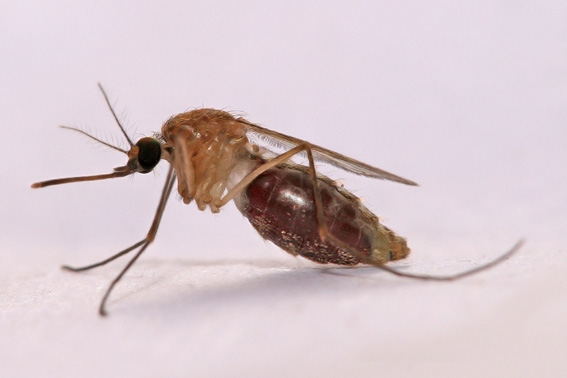Infection by the human malaria parasite leads to important changes in mosquito phenotypic traits related to vector competence. However, we still lack a clear understanding of the underlying mechanisms and, in particular, of the epigenetic basis for these changes. Genome-wide distribution maps of H3K27ac, H3K9ac, H3K9me3 and H3K4me3 by ChIP-seq and the transcriptome by RNA-seq, of midguts from Anopheles gambiae mosquitoes blood-fed uninfected and infected with natural isolates of the human malaria parasite Plasmodium falciparum were examined in Burkina Faso. 15,916 regions containing differential histone modification enrichment between infected and uninfected were reported, of which 8339 locate at promoters and/or intersect with genes. The functional annotation of these regions allowed to identify infection-responsive genes showing differential enrichment in various histone modifications, such as CLIP proteases, antimicrobial peptides-encoding genes, and genes related to melanization responses and the complement system. Further, the motif analysis of regions differentially enriched in various histone modifications predicts binding sites that might be involved in the cis-regulation of these regions, such as Deaf1, Pangolin and Dorsal transcription factors (TFs). Some of these TFs are known to regulate immunity gene expression in Drosophila and are involved in the Notch and JAK/STAT signaling pathways. The analysis of malaria infection-induced chromatin changes in mosquitoes is important not only to identify regulatory elements and genes underlying mosquito responses to P. falciparum infection, but also for possible applications to the genetic manipulation of mosquitoes and to other mosquito-borne systems. informacion[at]ebd.csic.es: Ruiz et al (2019) Chromatin changes in Anopheles gambiae induced by Plasmodium falciparum infection. Epigenetics & Chromatin 12(1):5 https://doi.org/10.1186/s13072-018-0250-9
https://epigeneticsandchromatin.biomedcentral.com/articles/10.1186/s13072-018-0250-9

